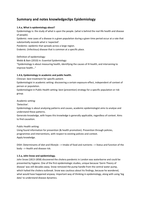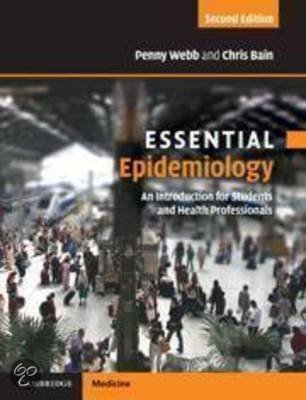Summary and notes knowledgeclips Epidemiology
1.4.a, What is epidemiology about?
Epidemiology is: the study of what is upon the people. (what is behind the real life health and disease
of people).
Epidemic: new cases of a disease in a given population during a given time period occur at a rate that
substantially exceeds what is 'expected'.
Pandemic: epidemic that spreads across a large region.
Endemic: (Infectious) disease that is common at a specific place.
Definition of epidemiology:
Webb & Bain (2010) in: Essential Epidemiology:
"Epidemiology is about measuring health, identifying the causes of ill-health, and intervening to
improve health..."
1.4.b, Epidemiology in academic and public health.
Clinician: best treatment for specific patient.
Epidemiologist in academic setting: discovering a certain exposure-effect, independent of context of
person or population.
Epidemiologist in Public Health setting: best (prevention) strategy for a specific population or risk
group.
Academic setting:
'Detective'.
Epidemiology is about analysing patterns and causes, academic epidemiologist aims to analyse and
understand these patterns.
Generate knowledge, with hopes this knowledge is generally applicable, regardless of context. Aims
to find causation.
Public Health setting:
Using found information for prevention (& health promotion). Prevention through policies,
programmes and interventions, with respect to existing policies and context.
Apply knowledge.
DISH: Determinants of diet and lifestyle --> Intake of food and nutrients --> Status and function of the
body --> Health and disease risk.
1.5.a, John Snow and epidemiology.
John Snow (1813-1858) discovered the cholera pandemic in London was waterborne and could be
prevented by hygiene. One of the first epidemiologic studies, unique because 'Germ Theory of
disease' was still decades away. Snow removed the pump handle from the central water pump,
which halted the cholera outbreak. Snow was cautious about his findings, because he wondered,
what would have happened anyway. Important way of thinking in epidemiology, along with using 'big
data' to understand disease dynamics.





